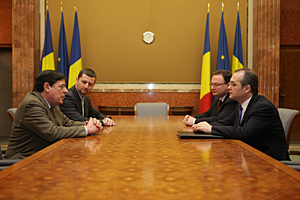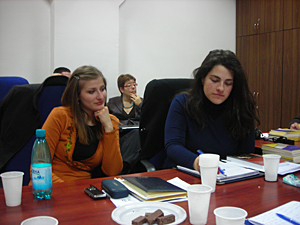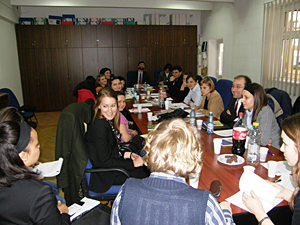

ADVERTISEMENT
- Rozovsky wins prestigious NSF Early Career Award
- UD students meet alumni, experience 'closing bell' at NYSE
- Newark Police seek assistance in identifying suspects in robbery
- Rivlin says bipartisan budget action, stronger budget rules key to reversing debt
- Stink bugs shouldn't pose problem until late summer
- Gao to honor Placido Domingo in Washington performance
- Adopt-A-Highway project keeps Lewes road clean
- WVUD's Radiothon fundraiser runs April 1-10
- W.D. Snodgrass Symposium to honor Pulitzer winner
- New guide helps cancer patients manage symptoms
- UD in the News, March 25, 2011
- For the Record, March 25, 2011
- Public opinion expert discusses world views of U.S. in Global Agenda series
- Congressional delegation, dean laud Center for Community Research and Service program
- Center for Political Communication sets symposium on politics, entertainment
- Students work to raise funds, awareness of domestic violence
- Equestrian team wins regional championship in Western riding
- Markell, Harker stress importance of agriculture to Delaware's economy
- Carol A. Ammon MBA Case Competition winners announced
- Prof presents blood-clotting studies at Gordon Research Conference
- Sexual Assault Awareness Month events, programs announced
- Stay connected with Sea Grant, CEOE e-newsletter
- A message to UD regarding the tragedy in Japan
- More News >>
- March 31-May 14: REP stages Neil Simon's 'The Good Doctor'
- April 2: Newark plans annual 'wine and dine'
- April 5: Expert perspective on U.S. health care
- April 5: Comedian Ace Guillen to visit Scrounge
- April 6, May 4: School of Nursing sponsors research lecture series
- April 6-May 4: Confucius Institute presents Chinese Film Series on Wednesdays
- April 6: IPCC's Pachauri to discuss sustainable development in DENIN Dialogue Series
- April 7: 'WVUDstock' radiothon concert announced
- April 8: English Language Institute presents 'Arts in Translation'
- April 9: Green and Healthy Living Expo planned at The Bob
- April 9: Center for Political Communication to host Onion editor
- April 10: Alumni Easter Egg-stravaganza planned
- April 11: CDS session to focus on visual assistive technologies
- April 12: T.J. Stiles to speak at UDLA annual dinner
- April 15, 16: Annual UD push lawnmower tune-up scheduled
- April 15, 16: Master Players series presents iMusic 4, China Magpie
- April 15, 16: Delaware Symphony, UD chorus to perform Mahler work
- April 18: Former NFL Coach Bill Cowher featured in UD Speaks
- April 21-24: Sesame Street Live brings Elmo and friends to The Bob
- April 30: Save the date for Ag Day 2011 at UD
- April 30: Symposium to consider 'Frontiers at the Chemistry-Biology Interface'
- April 30-May 1: Relay for Life set at Delaware Field House
- May 4: Delaware Membrane Protein Symposium announced
- May 5: Northwestern University's Leon Keer to deliver Kerr lecture
- May 7: Women's volleyball team to host second annual Spring Fling
- Through May 3: SPPA announces speakers for 10th annual lecture series
- Through May 4: Global Agenda sees U.S. through others' eyes; World Bank president to speak
- Through May 4: 'Research on Race, Ethnicity, Culture' topic of series
- Through May 9: Black American Studies announces lecture series
- Through May 11: 'Challenges in Jewish Culture' lecture series announced
- Through May 11: Area Studies research featured in speaker series
- Through June 5: 'Andy Warhol: Behind the Camera' on view in Old College Gallery
- Through July 15: 'Bodyscapes' on view at Mechanical Hall Gallery
- More What's Happening >>
- UD calendar >>
- Middle States evaluation team on campus April 5
- Phipps named HR Liaison of the Quarter
- Senior wins iPad for participating in assessment study
- April 19: Procurement Services schedules information sessions
- UD Bookstore announces spring break hours
- HealthyU Wellness Program encourages employees to 'Step into Spring'
- April 8-29: Faculty roundtable series considers student engagement
- GRE is changing; learn more at April 15 info session
- April 30: UD Evening with Blue Rocks set for employees
- Morris Library to be open 24/7 during final exams
- More Campus FYI >>
8:31 a.m., Feb. 24, 2010----“What do we know of Delaware if all we know is Delaware?” asks Arno Loessner, paraphrasing the famous question once posed by Rudyard Kipling about England.
Loessner, a professor emeritus in the School of Urban Affairs and Public Policy (SUAPP) at the University of Delaware, uses the question to help explain why he believes graduate students in public policy need to learn about other cultures and environments in order to become fully aware of their own.
This winter, Loessner conducted his 17th study abroad course since 1975. The course involved seven master of public administration (MPA) students in a trip to Romania, where they teamed up with 14 public administration graduate students at Babes-Bolyai University (BBU) in Cluj-Napoca to conduct cross-cultural research.
The students on this trip first met their Romanian counterparts via videoconference last October, when they discussed possible research topics. The students then continued their interactions via email and began to develop surveys and research questions for their work together in Romania.
“The use of technology permitted the group to get a head start on their work and to bond very quickly upon our arrival,” Loessner said. “Throughout the time we were together, they enjoyed each other's company and benefitted from the experience.”
Teams of two or three students worked side-by-side to conduct interviews and collect data on their topics of mutual interest. They met with leaders of Cluj city and county as well as representatives of Romania's central government, nonprofit organizations, schools, media and other well-informed individuals over two weeks of intensive study.
Each student research team is producing a 20-page research paper on their findings. The teams presented preliminary experiences and findings at a Jan. 21 forum in Romania. The presentations were preceded by a press conference at which students were interviewed by Romanian print and TV media.
Their research topics have included public health, public education, opportunities for economic and social development of minorities (especially the Roma population), disaster response, freedom of information, anticorruption measures, and the relationship of public transportation to air quality.
This was the ninth visit to Cluj for Loessner, a Fulbright Senior Scholar and international professor at BBU, who says that the UD program provides a unique opportunity in American higher education for graduate students to conduct cross-cultural research and prepare papers with graduate students of another culture as their research partners in a study abroad environment.
BBU's MPA degree program is modeled on American standards and pedagogy. It is one of three accredited MPA programs in Central and Eastern Europe. Loessner believes this model of study abroad has the potential to increase the scope and range of engagement at the global level, not only for graduate students at UD and BBU, but at other universities around the world.
The Network of Institutes and Schools of Public Administration in Central and Eastern Europe seems to agree. The organization recently published Study Abroad for Graduate Students: Combining Teaching and Research in a Cross-Cultural Course in Public Administration and Public Policy, a book Loessner co-edited with BBU Dean Catalin Baba and BBU Chair Calin Hintea that explains the study abroad model and contains examples of student research papers presented at professional conferences in Europe.
The program in Romania is part of ongoing efforts by SUAPP to encourage graduate students to engage in international study as part of the public affairs curriculum. Other recent study trips have taken place in South Africa, South Korea, China, and the Netherlands.
SUAPP Director Maria Aristigueta says, “These courses are distinctive among U.S. public affairs programs and a model for other graduate programs. Our curriculum follows an integrated model of combining teaching with applied research and practice as, and programs that do this, such as Legislative Fellows and study abroad, have made the University of Delaware's School of Urban Affairs and Public Policy unique and cutting edge in the translational global environment. Opportunities like the one provided to SUAPP students with BBU provide a forum to build new research partnerships and recruit students across the globe.”
Loessner says study abroad strengthens students' ability to think differently and holistically, as they come to understand through daily work that not only will problem-solving strategies differ abroad, but the definition of the “problem” often does as well.
Bill Collins, an MPA candidate whose research focuses on freedom of information and public access to information, says the process of conducting research in Romania is quite different than in the United States. In Romania, he says, speaking to the key people and organizations is usually the best way to obtain certain data and information. This factor made it important to have Romanian contacts and native speakers on the research team.
“I realized very quickly that going to a government's Web page and searching for information wasn't going to provide the nuance we needed to understand issues well,” he said. “In Delaware, you can go on Delaware.gov and search out pretty much anything from policies, to regulations, proposed legislation, financial statements, meeting minutes, court decisions and career opportunities. In the evolving system of Romania, the Internet is a vastly underutilized resource. In municipalities that actually have a Web site, the public information available is limited.”
Graduate research assistant Austin Egan, along with two BBU students, researched access to education and policies in education related to equality. He says that the knowledge and work ethic of the Romanian students were matched by their hospitality and kindness.
“Overall, I had an extremely fulfilling trip,” he said. “I am really honored to have been a part of this exchange. Dr. Loessner has built a great study abroad program, allowing the students to assume great responsibility among ourselves and our Romanian counterparts.”
“This clearly successful Romanian program further demonstrates our commitment to enhancing the global educational opportunities available to our graduate students,” said Debra Hess Norris, vice provost for graduate and professional education, Henry Francis du Pont Chair in Fine Arts, and chair of the Department of Art Conservation at UD. “We are proud of these students' accomplishments. Their projects demonstrate the excellence of our graduate scholars and their intense quest for discovery, innovation and public service.”
Romanian Ramona Dragomir, a second year master student, said, “The exchange program presented an opportunity to be exposed to a new learning environment by facilitating the dialogue with the fellow students in the U.S. It provided us with the context to practice and improve our field research skills as well as allow us to compare and contrast the two cultures thus broadening our perspectives."



